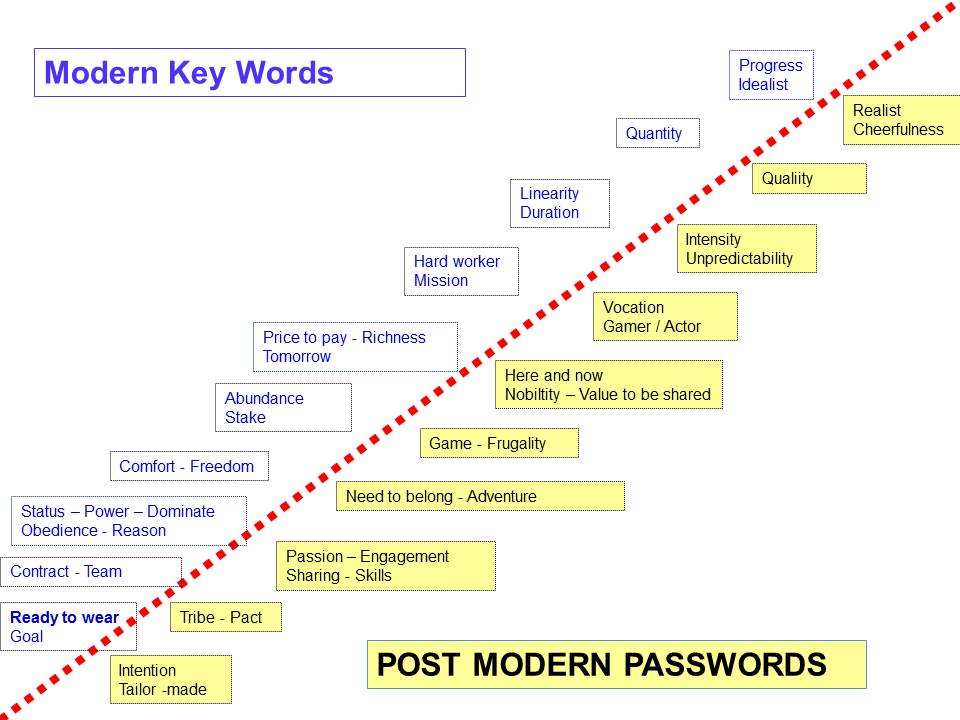MPM Project Management
Managing Post-Modern Issues, or « How to adapt to new employee-motivating levers »
 The world has changed, and so have enterprises. A post-modern atmosphere appears to be emerging irreversibly and irresistibly before our eyes, and is upsetting the managerial paradigm. It’s a tough job being a manager or being managed in 2012! Poor visibility, constant changes in direction, one meeting after another, that’s the manager’s daily lot. Hardly surprising then to see teams and individuals destabilized, demobilized and saturated. Despite all this, how can we still get something from our teams? In an attempt to address this question, the text below formalizes three convictions that redefine management’s place and role in the post-modern world, then analyzes 6 fundamental breaks between the modern and post-modern worlds and 6 new motivation levers that can be pulled to give back meaning to daily tasks and prompt employee mobilization and action.
The world has changed, and so have enterprises. A post-modern atmosphere appears to be emerging irreversibly and irresistibly before our eyes, and is upsetting the managerial paradigm. It’s a tough job being a manager or being managed in 2012! Poor visibility, constant changes in direction, one meeting after another, that’s the manager’s daily lot. Hardly surprising then to see teams and individuals destabilized, demobilized and saturated. Despite all this, how can we still get something from our teams? In an attempt to address this question, the text below formalizes three convictions that redefine management’s place and role in the post-modern world, then analyzes 6 fundamental breaks between the modern and post-modern worlds and 6 new motivation levers that can be pulled to give back meaning to daily tasks and prompt employee mobilization and action.
The 3 convictions of the post-modern manager:
Conviction 1: Good management does not simply mean reacting to the economic context or trend for management has always been needed whatever the context or trend. But what has changed are the registers on which management must be based if it is to be perceived as both pertinent and consistent.
Conviction 2: Employee engagement is a matter of era and circumstance. In 2012, employees do not commit to their jobs for the same reasons and under the same circumstances as a few years ago. Understanding and adapting to today’s motivation levers is key to setting up a management system that conveys meaning.
Conviction 3: The post-modern manager must be able to step in between the company’s ever more complicated context and its employees who are ever more baffled and unsettled by this context. Indeed, it is this very capacity to interpose in complex situations that forges the post-modern manager’s legitimacy and credibility.
These 3 convictions set the scene for the post-modern management hypothesis. Now we have to find the fault lines into which we can step for our legitimate and credible interventions. It is in our search for these fault lines that we find 6 major breaks between the modern and post-modern worlds. And it is very probably these breaks that hide something potentially very disturbing for our current management, and potentially very exciting for our future management.
The 1st break between the modern and post-modern worlds is the gradual shift from reason to passion.
In the modern world we wanted to explain everything, rationalize everything, standardize everything, homogenize everything: behaviors, techniques, processes. In the emerging post-modern world, reason has become saturated, and passion is starting to peep out! This is good news for all managers who were bored or irritated by the « reasoned » approach. The demand for passion is on the up. Today, we are more a « fan of« , than « coldly for » or «coldly against« . We more « want to » than « need to« . We prefer to « have the feeling that« , rather than « have the argument for« . Though difficult to channel, passion is back and will open up and offer new opportunities for tomorrow’s management.
The 2nd major break between the modern and post-modern worlds is the shift from duration to intensity.
In the modern world it was duration that counted since the future was synonymous with progress and hope. In the emerging post-modern world, what counts more is the intensity with which I am living here and now. This change in our relationship with time stems from the new feeling that the future does not necessarily hold better days. It may in fact sometimes mean precarity and uncertainty. It is this feeling of « potential precarity » that gives people the desire to live the present intensely rather than bet all on a very uncertain future. But how can we manage employees who are not necessarily preparing their future? Managing duration and managing intensity require completely different, even opposing, levers, and for modern managers this can be totally baffling! Yet the growing desire for intensity in employees should, if detected, give birth to new motivation levers.
The 3rd major break between the modern and post-modern worlds is the shift from injunctions to interactions.
In the modern world, hierarchical relations were guided by injunctions, and these still often form the basis of contracts between employees and employers. The problem is that the 2 parties adhere less and less to the contract, and its injunctions therefore become increasingly sterile. In the emerging post-modern world, hierarchical relations – if not already replaced by networking – are increasingly built on real interactions which, in passing, transform « the contract » (a very mechanical relation between an employer and an employee) into a « pact » (a far more biological relation between 2 people). Obviously, a pact cannot be managed like a contract, and obviously the capacity to transform a « contract » into a « pact » can potentially create very interesting new motivation levers.
The 4th break between the modern and post-modern worlds is perhaps the most entertaining as the notion of a « challenge » is gradually turning into the notion of a « game ».
In the modern world, everything was a challenge. We had business challenges, strategic challenges, professional challenges and personal challenges. This multitude of challenges, accompanied by the cult of performance, finished by wearing down and wearying even the most dedicated company man. As a reaction to this multitude of diverse challenges, the notion of a « game » is starting to emerge. Despite or because of the crisis, individuals are gambling like never before, and have never bet on such a range and diversity of subjects. Employees are in crisis, but employees are having a good time, playing and betting. Are games a new motivation lever for our teams and employees? And were this to be the case, how can we play games with business goals, action plans and variable remuneration systems?
The 5th break between the modern and post-modern worlds is one that is gradually shifting us from dispersion to focalization.
In the modern world, everything was a priority, and this caused a dispersion of energies and vital resources. To preserve our physical and mental health, we have learned to protect ourselves, and particularly to take refuge in what is really important for us. Could this retrenchment, this relativism, or this letting go be turned into a lever? How can we set up a system of post-modern management that focuses on what is essential and sacred in the eyes of our teams and employees? This is what we will attempt to discover in the text below.
The 6th and last break between the modern and post-modern worlds is perhaps the most subtle of all, and constitutes the transformation of the individual into a person.
In the modern world, we liked to slot people into categories by individual type or profile in order to manage them very rationally and very mechanically. The problem is that individuals are not only rational, in fact they tend to be less and less so for they are saturated with reason. Today’s employee is not a homogeneous individual with stereotyped, perfectly predictable reactions. Today’s employee is singular-plural and wears different masks depending on the situation and circumstances. These different masks explain why the same individual may have very different or even contradictory, reactions and behaviors depending on the situation and circumstances. Whereas we learned in the past to manage very rational individuals who erect very impermeable barriers between their different lives, we are increasingly faced with post-modern people who are far more elusive and far more unpredictable since they are living several lives at the same time, including their job. We are getting the feeling, at least instinctively, that our management style must evolve to match the different facets of the person we are facing, and enter into win-win pacts with these different facets.
The 6 breaks described, and maybe others, are unfolding every day before our eyes. They are making managers either less effective – if they continue to ignore or look down on them – or alternatively more effective if they have the courage, the audacity and the talent to transform them into new motivation levers. If we want to be this post-modern manager who is able to step in between the context and employees or teams, then we will have to go with the flow of these breaks and adapt to the new motivation levers that work for employees and teams. So what are these new motivation levers likely to be, and above all how can we pull them?
A 1st post-modern motivation lever could be MAGIFICATION.
Magification is a manager’s capacity to convey to others a sublime vision of the job or mission. How can this lever be pulled? By reconciling « mission » and « vocation »! The ability to converge employee vocation and mission is a very post-modern managerial capacity. This convergence between mission and vocation offers employees consistency in their action, legitimacy in their mission and nobility in their work, lending them wings. Magification is basically the manager’s capacity to introduce the mission to an employee, not as a job to be performed, but as something to be accomplished. And the more this coincides with the person’s vocation, the more they are likely to be mobilized and energized.
A 2nd post-modern motivation lever could be GAMIFICATION.
Gamification is the manager’s ability to turn job-related activities into experiences that involve games and fun. How can this lever be pulled? By simplifying employee missions. Simplifying a mission means increasing its yield and efficiency while rendering it easier to carry and conduct. It is the complexity and ineffectiveness of things asked for every day that discourages and burdens the troops. Given the increasing need for play and games in our teams and employees, the key question for the post-modern manager is therefore « what daily degree of effectiveness and freedom from burden should I offer or impose upon my teams? » Another possible key question could be « do I have the capacity to transform my own challenges into a game for my co-workers, because basically if I can, this may be the best way in the post-modern world to meet them! »
A 3rd motivation lever for the post-modern world could be INITIATION.
Initiation is the manager’s ability to offer others the possibility of constant learning. In the modern world, intelligence was above all quantitative. And in this quantitative intelligence model, added value lay mainly in the mechanical and robotic force of employees and processes. But because this model was highly standardized, it did little to prompt or facilitate the development of autonomy, creativity and responsibility. In the emerging post-modern world, quantitative intelligence is in the process of being replaced by qualitative intelligence. The modern era presented us with a quantitative challenge. The post-modern era presents us with a qualitative challenge, for which we are particularly ill prepared. It is therefore up to us, apprentice post-modern managers, to set the tone through management that initiates and promotes quality rather than quantity, and creation rather than repetition. This is a real challenge for our neurons and real torture for our reflexes and performance markers that are still very quantitative.
A 4th post-modern motivation lever could be CONCENTRATION.
Concentration is the manager’s ability to focus on what is useful. If we want to concentrate on what is useful, while avoiding detours and counter productivity, we must always ask ourselves, before acting, if we are:
- In fast-forward time, i.e. in a period where we have good visibility and a perfectly clear course. In this case, we can concentrate on accelerating rhythms and rates.
- In saturated time, i.e. in a period where we have too much to do all at the same time. In this case, we can concentrate on the choices to be made. In the post-modern era, it’s no longer « cheese and dessert » but « cheese or dessert »! We will have to learn again how to choose!
- In compressed time, i.e. in a period where we no longer have a past and not yet a future. In this case, we can concentrate on setting a new course, choosing a new destination and a new path to get there.
A 5th post-modern motivation lever could be called SINGULARIZATION. Singularization is the manager’s ability to shift from the individual to the person.
The era of the standardized, robot-like employee is over. The future is in tailor-made, or even haute couture, and it is thanks to the singularization of management that we will achieve tailor-made or haute couture in our teams. To singularize our management we must learn to prefer commitment over obedience. This is far from being a natural reflex after so many years of asking our co-workers to apply the corporate strategy. This freedom of creation, expression and action is possible on condition that we accept its corollary. And the corollary of freedom is responsibility. Being responsible means having the freedom to make choices then being accountable for these choices. There is no responsibility without freedom, and no freedom without responsibility. Freedom without responsibility is irresponsibility, and responsibility without freedom is harassment! « Do what you like, but with engagement. » That is how we could represent the force of « freedom-responsibility »! For the post-modern manager, rendering co-workers free and responsible is a form of SINGULARIZATION that ultimately is always greatly appreciated for it is often an excellent way to take account of persons as a whole, such that they may express and utilize their different sensibilities. A concrete example of singularization is provided by Google where all employees have the right to devote 20% of their working day to personal initiatives related to Google’s business, without needing a management go-ahead. The result: 80% of Google’s innovations stem from this 20% of the work performed.
A 6th post-modern motivation lever could be called SACRALIZATION. Sacralization is the manager’s ability to define then protect what is essential and vital for his or her « tribe »!
After a modern era characterized by abundance and a no-limit attitude, the post-modern era will give us the opportunity to focus on what is essential and vital for us, with real arbitration and real choices to be made. Goodbye abundance, hello frugality … that’s one of the major changes between the modern world – where resources were readily accessible – and the post-modern world where resources are in short supply! Everyone will have to become more autonomous (in all senses of the term) and learn to do better with less. In practice, post-modern managers will increasingly be networking in a « tribe », serving very engaged projects and strong values. The real boss in the post-modern era is the project and values. All the rest is mere chatter. Compelled by our new-found frugality, this project will be cheese or dessert, cake or eat it, but not both! This art of frugality will cause to re-emerge a sense of the sacred and the vital which has nothing to do with the art of sacrifice, for sacrifice is often suffered whereas frugality is desired. To enter into a real pact with his or her « tribe », the post-modern manager will ask the question: was everything to be taken away, except one thing, what would that one thing be? And what price are we willing to pay to keep it?
It is with this question, so full of significance, that we shall conclude our foray into the post-modern world that appears to be unfolding before our eyes and that is upsetting our managerial reflexes and our conscience. Of all the breaks between the modern and post-modern worlds, there is one that encloses all the others: the break in vocabulary. The passwords of the post-modern era are no longer the key words of the modern era. To update our managerial vocabulary, the modern/post-modern terminology guide appended hereto will hopefully help each and everyone advance at their own pace toward post-modern management.



